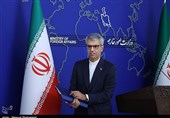Catalan Election Campaign Kicks Off with Candidates in Jail
TEHRAN (Tasnim) - Catalan political parties officially kicked off their campaign for a December 21 regional election on Tuesday, with separatist candidates either in exile or in jail and polls pointing to a tight race.
The first rallies were held with Catalonia's sacked vice president Oriol Junqueras and three other separatist leaders still in prison after a Supreme Court judge on Monday turned down their request to be freed while they are investigated over their role in the wealthy northeastern region's independence drive.
Catalan leader Carles Puigdemont meanwhile campaigned by video conference from Belgium, where he escaped to after his region's parliament declared independence on October 27, claiming he would not get a fair trial at home, AFP reported.
"They (Madrid) want to raise as many difficulties as possible so we can't campaign on an equal footing with the other candidates," he said in his address to his party's rally in Barcelona just before midnight.
Voters "can choose between nation and submission, they can choose between Catalan institutions or dark characters in Madrid", added Puigdemont, whose extradition has been requested by Spain.
Madrid wants to prosecute Puigdemont and the other jailed separatist leaders for rebellion -- which carries a maximum 30-year prison sentence -- and sedition for their role in the independence drive, as well as for misusing public funds.
A yellow ribbon to signify support for the jailed separatist leaders occupied an empty seat that had been reserved for Puigdemont at the rally.
A yellow ribbon also occupied the empty chair reserved for Junqueras at his party's opening rally in the town of Vic about 100 kilometers (60 miles) further north.
Madrid called the new elections after the independence declaration, while dismissing Catalonia's government and suspending the region's autonomy. It hopes the polls will restore normality to the region.
Twelve of the 13 members of the sacked Catalan government are standing in the election, with Puigdemont and Junqueras competing to head the separatist camp.
During the last regional election in 2015 separatist parties captured 47.8 percent of the vote, giving them a slim majority of 72 seats in the 135-seat Catalan regional parliament.
While the separatists are united against what they say is "repression" from Madrid, they are divided over the future of their region.
Puigdemont's PDeCAT party and Junqueras' ERC ran on a joint list two years ago but are running separately this time around.
"Given the ongoing disagreements between secessionist parties over how to proceed, their leaders have an incentive to campaign on the ongoing grievances towards the central government while keeping their electoral programme vague," said Teneo Intelligence analyst Antonio Barroso.
A poll published Monday by the central government's Sociological Research Centre (CIS) predicted that the three pro-independence parties would get 44.4 percent of the vote and 66 to 67 seats, just under the absolute majority of 68.
The three parties firmly opposed to independence would get 44.3 percent and gain 59 to 60 seats, the poll suggested.
"I see it difficult for the alliance of the three separatist parties to repeat itself just like I see it difficult for a government formed by the three anti-independence parties to emerge," said Jose Pablo Ferrandiz, a sociologist at polling form Metroscopia.
The likely kingmaker according to the polls will be En Comu, the alliance made up by far-left party Podemos and Barcelona mayor Ada Colau, which according to the CIS poll would capture nine seats.
The party opposes independence but backs a legally binding referendum on secession which Spain's central government deems unconstitutional.
"We hold the key to unblock the situation, the key that could open a new period of solutions," the party's lead candidate in the election, Xavier Domenech, told the party's opening rally in L'Hospitalet de Llobregat.
While En Comu "is ultimately more likely to support a new separatist-led government" it "will very likely resist any attempt by the new government to take unilateral steps towards secession," said Federico Santi, an analyst with political risk consultancy Eurasia Group, adding "repeat elections are also possible".






